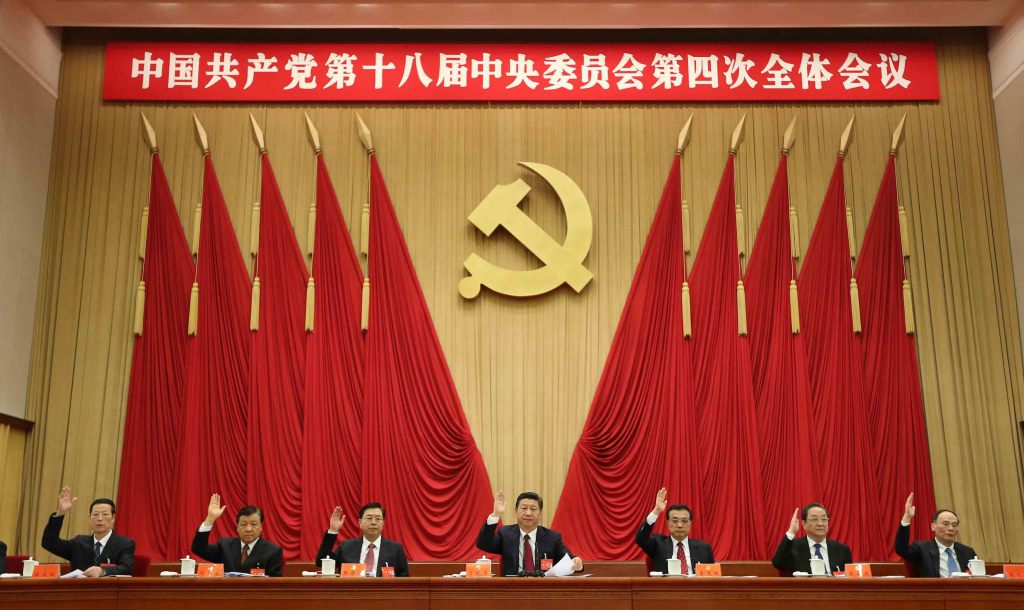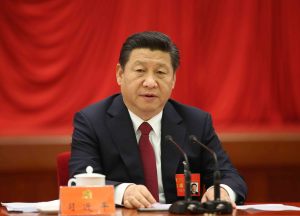
From L-R: Zhang Gaoli, Liu Yunshan, Zhang Dejiang, Xi Jinping, Li Keqiang, Yu Zhengsheng, Wang Qishan
The Fourth Plenum Decision (Decision) was positively received by many domestic and foreign media, analysts and commentators. On the face of it, it appears to signal the Chinese Government’s intent to step back from its legal institutions, thereby ushering in a new era of judicial independence, but is this the complete picture? Jonathan Fenby, China Director of Trusted Sources, delves deeper into the language of the Decision and although he finds some positives, he finds much less to write home about.
Reports of the latest Chinese Communist Party Plenum have made much of a drive by the leadership in Beijing to improve the ‘rule of law’. If that were the case, it would represent a major positive step in the process of change promised by the previous plenum in November 2013. Establishing a strong, independent legal system is an essential step in enhancing the rights of individuals and providing a level playing field for companies and investors.
Boosting hopes that this may be on the leadership’s agenda, official Chinese media, along with some investment bank analysts and foreign media commentators, have hailed the plenum as, in the words of one of the former, “a blueprint for the law of law”. This is playing with words.
As has been the case for more than 2,500 years, the view from the top in China is that the country needs rule by law – not rule of law. No doubt, Xi Jinping, the president, and his colleagues want the law to operate more effectively. But their aim is to make the system more responsive to the Party and its wishes, not to empower it in such a way that it can make the regime and its organs more accountable. Law is too important to be left to the courts. Ever since the First Emperor more than two millennia ago with his doctrine of Legalism, the use of law to keep the people in line is seen as an essential plank of top-down rule.
Reflecting the desire to strengthen the Party State, which one might think contradicts the desire for market-led reform expressed in last year’s plenum ‘Sixty Decisions’ statement, a communiqué from this year’s plenum drew attention to the need for the law to ward off dangers to the regime and maintain stability. (It also called for strengthening of security and “social management” together with the enactment of anti-terrorism legislation in reaction to the rising tide of violence involving Muslims in the western territory of Xinjiang).
 To allay any doubt, the plenum made plain its view that “persisting in party leadership is the basic requirement for the socialist rule of law … party leadership and the socialist rule of law are identical”. To give a better spin for foreigners, however, these words were not included in Xinhua News Agency’s English translation. But the Chinese original added that “China’s constitution establishes the leading status of the Chinese Communist Party.”
To allay any doubt, the plenum made plain its view that “persisting in party leadership is the basic requirement for the socialist rule of law … party leadership and the socialist rule of law are identical”. To give a better spin for foreigners, however, these words were not included in Xinhua News Agency’s English translation. But the Chinese original added that “China’s constitution establishes the leading status of the Chinese Communist Party.”
This is not to say that there were no proposals for change in line with Xi’s drive to improve efficiency and centralise authority. A decision was taken to streamline the court structure with the establishment of circuit courts under the Supreme People’s Court, plus courts and prosecutors’ offices that will cut across jurisdictions at the local level. The aim is to sever direct connections between local judges and local Party leaders and thus enhance Beijing’s control. For foreign companies operating on the mainland, this could make it easier to avoid rulings by county-level bureaucrats with their own agenda. But the high-level officials who will now be empowered to deal with local-level cases are usually political appointees who are unlikely to be any less defensive of the party state, even if they do not let local interests guide them. “Adjudication committees”, which meet in secret to determine the outcome of cases that do not go to open court, will continue to be a preferred instrument for reaching decisions.
Awareness of the poor quality of many legal officials was evident in a pledge by the plenum to try to recruit “lawmakers, judges and prosecutors who are qualified lawyers and law experts”. It also said that officials would be judged on their effectiveness in upholding the law, which would be a “significant index” in evaluating promotions and demotions. Prosecutors will be allowed to file class action-style lawsuits in the public interest, and there was talk of making the government more transparent. But the ‘dualist’ system that allows some openings for companies to take action against private firms, but continues to protect those connected to the state or the Communist Party, is likely to remain in force.
 Under “the Socialist rule of law with Chinese characteristics”, the courts remain under political supervision – judges are required to swear an oath of loyalty to the Party. Most important at the moment is the way the big anti-corruption campaign initiated by Xi two years ago is being conducted through the Central Commission for Discipline Inspection. This body acts independently of the legal system and without any public accountability. Before a recent meeting of the Commission, its Secretary, Wang Qishan, said the fight against graft would never end.
Under “the Socialist rule of law with Chinese characteristics”, the courts remain under political supervision – judges are required to swear an oath of loyalty to the Party. Most important at the moment is the way the big anti-corruption campaign initiated by Xi two years ago is being conducted through the Central Commission for Discipline Inspection. This body acts independently of the legal system and without any public accountability. Before a recent meeting of the Commission, its Secretary, Wang Qishan, said the fight against graft would never end.
Though it did not pronounce on the highest-level anti-corruption case, that of former internal security boss Zhou Yongkang, the plenum showed the way the system works by announcing the expulsion from the Communist Party of four of his associates. They were former Deputy Public Security Minister Li Dongsheng, a former head of the SASAC (the umbrella body for big state enterprises) Jiang Jiemin, Deputy General Manager of the CNPC oil group, Wang Yongchun and former Deputy Party Chief of Sichuan Li Chuncheng. The absence of an announcement on Zhou indicates that the case against him is not complete. As Zhang Sujun, a Deputy Justice Minister, said recently: “The investigation is still ongoing because we are going to review and investigate the case according to the law and also pay attention to evidence, so this process may be a long process, but also a more serious and responsible process,”
Thus, for all the references to rule of law, it is rule by law that prevails, with party organs like the Discipline Commission acting outside the law, empowered to detain people without charge and hold them in secret without reference to the courts, which only enter the picture once the accused have been thrown out of the party. That balance of power says a great deal about the way the system works and will continue to work as China’s leaders stick to the Legalist tradition of using the law for control, not as recourse for the ruled.
This article was originally published in the Financial Times http://blogs.ft.com/beyond-brics/2014/11/06/guest-post-small-word-big-difference-in-chinas-rule-by-law/?Authorised=false, and is republished here with the permission of the author.
Jonathan Fenby was a co-founder of Trusted Sources in 2006. He is a leading analyst on China with a strong following in the investment community. His specialist area is policy interpretation, politics and the broader political economy. He was formerly editor of The South China Morning Post, The Observer and Reuters World Service as well as a senior correspondent for The Economist. He is the author of eight books on China, most recently Will China Dominate the 21st Century?
He blogs on China at http://www.trustedsources.co.uk/blogs/china and is on Twitter @JonathanFenby


Recent Comments